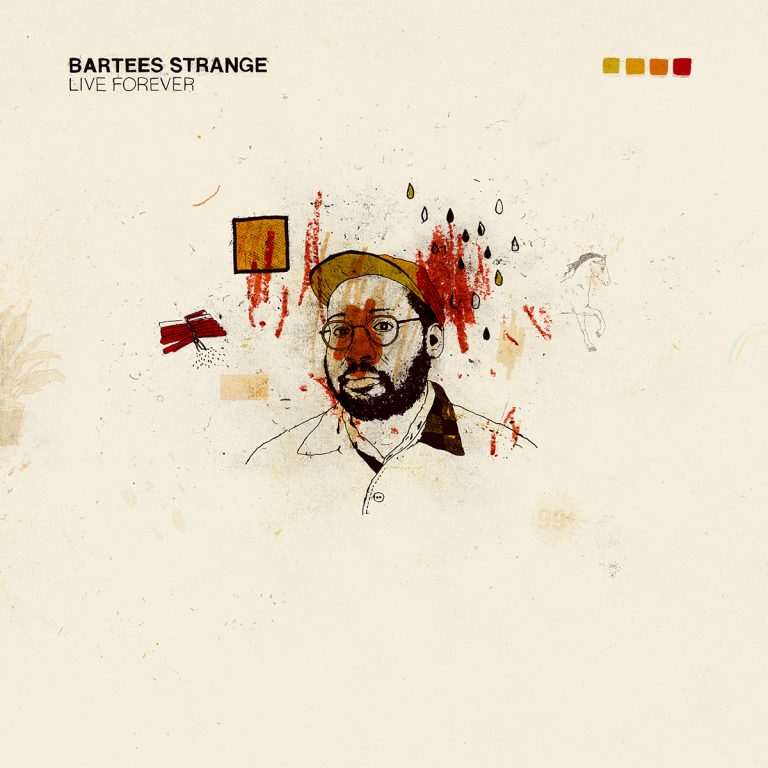Bartees Strange is still figuring himself out, just like anyone else. It’s a process, and resting on laurels breeds complacency. Born Bartees Cox, Jr., the Washington D.C.-based artist has given himself time to fine-tune things and settle on a musical direction, the realisation of which is anything but straightforward. The 11 songs that make up Live Forever draw on disparate influences to convey many different moods – that he’s confident enough to unveil such a wide-ranging set on his debut album speaks volumes. His debut EP Say Goodbye to Pretty Boy reimagined songs by The National in a similarly ambitious fashion, reframing melodies and recontextualising lyrics to fit his own experience.
Strange has been on the fringes of the wider indie rock scene for a while now; a predecessor to this project was Bartees and the Strange Fruit, under which name he released an EP called Magic Boy in 2017. It was a low-key affair that showed plenty of promise, and though the adoption of a new moniker heralded a creative switch-up of sorts, his debut album tips its hat to previous work on opening track “Jealousy”, a scene-setting introduction that places the focus on his remarkable, multifaceted voice as it soars over a serene ambient backing where Strange invites the listener into his world. “Come to a place where everything’s everything,” he offers – hinting at the scope of what’s to come.
The opener fades into the roar of plane engines, heralding the record’s takeoff with “Mustang” – its title referencing the Oklahoman sundown town in which Strange grew up. Crashing in with bombastic drums and a soaring guitar hook, it couples its musical attack with deeply personal lyrics (“It’s nice to think that folks are near / Waking up was hard this year”) before summing up the ethos of the record in a single line: “If I didn’t move the way I did, then tell me, how else could I be?” Growing up in an overwhelmingly white and conservative town forced Strange to hide himself just to get by, but he threw himself into music, and soaked up a host of influences as a result of his insatiable appetite for discovery; hence, his debut album’s eclectic sound. His experiences shaped him into the artist he’s become, shrugging at the idea of easy categorisation.
“Kelly Rowland” dips into R&B territory, buoyed by stuttering melodies; “Boomer” blends a rapped cadence with bluesy guitar licks and a punchy chorus that displays Strange’s rock bonafides; the cacophonous “Mossblerd” addresses that idea of expectation specifically in a Black artistic context, as he laments the idea of being boxed in by genre and classification on what is arguably the record’s most intense moment, at least musically. Genres keep Strange and his contemporaries “in their boxes / from their commas / from their options,” and his desire to break free from all that is expressed with steely conviction as he dreams of New York’s iconic Beacon Theatre: “Let a god’s wings burn / If I can’t play the Beacon, Imma bring the Mossblerd.”
As that song has it, Strange certainly isn’t short on ambition, and this is borne out throughout Live Forever. Its divergent musical palette incorporates everything from heart-on-sleeve alt-folk (“Fallen For You”) to propulsive dance-pop (“Flagey God”) via brass-flecked, anxious introspection (“In a Cab”) and sweeping post-rock soundscapes masking Strange at his most vulnerable (gold-plated, song-of-the-year contender “Stone Meadows”) – and, somehow, everything makes perfect sense in context. Genre doesn’t matter a damn here, with boundaries blurred and barriers smashed simply because they’re there for the taking.
Concluding with the two-part mini-epic “Ghostly”, which begins by conjuring up an atmosphere with its synth-heavy squall, before a superbly-executed transition into a cathartic finale – no mean feat, given that its lyrics address Strange’s struggles with self-worth and “feeling ghostly bad / way beyond description.” It closes an album full of surprises by bringing together those disparate parts to form a unified whole. In a sense, “Ghostly” presents the record in microcosm, in a manner similar to that key line in “Mustang” – the rug is pulled out from beneath the listener’s feet when they least expect it.
There’s so much ground covered on Live Forever that its easy to forget that it’s 35 minutes long. Strange’s genreless approach to making music means that its eventual follow-up could explore any of the sonic avenues the album heads down – or something else entirely. He’s still figuring himself out, after all. He may have been on the fringes until now, but with Live Forever, one of the year’s most daring records, he signals his intent – this is an artist not merely requesting his seat at the table, but demanding it.

